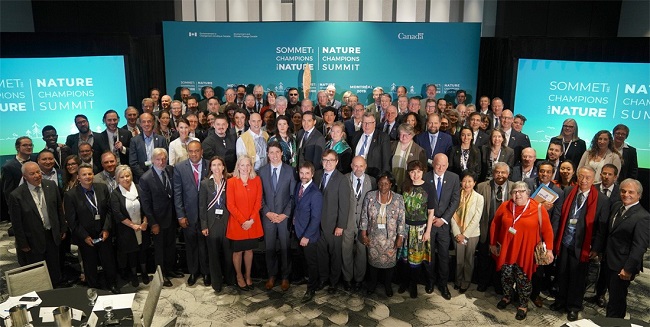The inaugural Nature Champions Summit closed on Thursday, April 25, 2019 with a call to put nature at the centre of the global discourse together with climate action and sustainable development.

The Government of Canada convened the conference from April 24 to 25 in Montreal, bringing environment ministers and government officials from around the world together with representatives of UN agencies and civil society organisations, indigenous peoples and local communities, as well as business leaders and philanthropists.
“I do not need to tell you that we are the last generation that can act for the climate and biodiversity. Those two topics are closely linked. You cannot address one without the other,” Prime Minister Justin Trudeau told delegates. “Climate change is threatening nature, our houses and our ways of life. When we destroy our natural ecosystems, this speeds up the process.”
CBD Executive Secretary, Dr. Cristiana Pașca Palmer, welcomed the Summit and commended Canada for its leadership on environmental matters. The Government of Canada has pledged to double the area under protected status, meeting the CBD Aichi Biodiversity Targets of 17 per cent of land and inland waters and 10 per cent of coastal and marine areas protected by 2020. The Government has also committed $500 million to establish a Nature Fund with private sector partners.
“Canada has achieved this progress by rallying all of society, business, government and civil society, cities and provinces, indigenous peoples and local communities, towards this shared goal,” Dr. Pașca Palmer said.
Summit participants exchanged views on challenges and opportunities for nature conservation and sustainable use, including how to raise ambitions, design and use innovative financing mechanisms and finding synergies with other pressing global concerns. Stressing the importance of ambition, integration and partnerships, the Summit sought to forge a diverse coalition to drive worldwide actions for responsible stewardship of nature.
“We need to build a high-ambition coalition of nature champions, to accelerate the protection of nature, to promote new solutions and to inspire further integrated actions for global nature protection,” Canadian Minister of Environment and Climate Change, Catharine McKenna, said.
“We also need to link agendas,” she added. “We need to stop talking about climate in the climate world, nature in the nature world, oceans in the oceans world, circular economy in the circular economy world, Sustainable Development Goals in the Sustainable Development Goals world. These are all the same thing.”
A Call for Action issued at the close of the Summit urged people the world over to join a global movement for nature-based solutions. “With the world coming together to address the critical issue of climate change and advancing the Sustainable Development Goals, we have an opportunity to work together toward our common goals. In fact, putting nature first is a winning economic strategy for governments, economic actors and citizens today and for the future.”
The Call to Action appealed for an ambitious and transformative global biodiversity framework to be adopted at the 15th Conference of the Parties (COP15) to the Convention on Biological Diversity next year in Kunming, China. It urged greater efforts to enable more people to participate in the implementation of the Convention.
“This is a critical Conference, but it is not a stand-alone meeting but rather part of a broader agenda and process,” the CBD Executive Secretary said. “And these meetings must be points for action! Even amid this crisis, we can move from crisis management to transformative change.”
The Montreal Nature Champions Summit placed a special focus on partnerships with indigenous communities and the need to incorporate traditional knowledge in strategies for nature conservation and sustainable use.
“We want jobs and opportunities, like everyone else, and economic growth and economic prosperity. But we don’t want it to be a trade-off of letting go of our culture,” said Sandra Inutiq, chief negotiator for the Qikiqtani Inuit Association. “We want those opportunities that honour our relationship of reciprocity with our homeland.”
Along with Uganda, Canada currently serves as co-chair of the United Nations process, under the Convention on Biological Diversity, leading to the adoption of a new international framework for biodiversity beyond 2020. The Nature Champions Summit is an important marker in a series of high-profile events leading up to COP 15 in 2020. Delegates urged global leaders to keep nature in focus at the G7 Environment Ministers’ Meeting next month in France, the Trondheim Conference on the post 2020 process for the Global Biodiversity Framework in July in Norway, the UN General Assembly in September in New York and the 2020 World Conservation Congress in France.
“We Nature Champions gathered at Montreal are beginning a global mobilization with this Call to Action, jointly committing to take a different, better path that puts nature first, recognizing it is the context for all life including human life and protecting it accordingly,” the Call to Action said.
